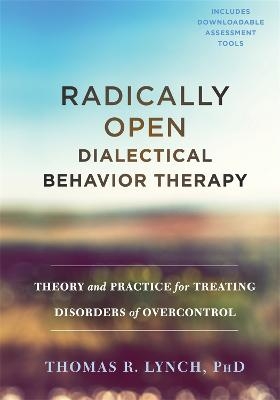
Radically Open Dialectical Behavior Therapy
Theory and Practice for Treating Disorders of Overcontrol
Seiten
2018
New Harbinger Publications (Verlag)
978-1-62625-928-7 (ISBN)
New Harbinger Publications (Verlag)
978-1-62625-928-7 (ISBN)
Radically open-dialectical behavior therapy (RO-DBT) is a breakthrough, transdiagnostic approach for helping clients with extremely difficult-to-treat overcontrol (OC) disorders such as anorexia nervosa, chronic depression, and obsessive-compulsive disorder (OCD).
Based on over twenty years of research, radically open dialectical behavior therapy (RO-DBT) is a breakthrough, transdiagnostic approach for helping people suffering from extremely difficult-to-treat emotional overcontrol (OC) disorders, such as anorexia nervosa, obsessive-compulsive disorder (OCD), and treatment-resistant depression. Written by the founder of RO-DBT, Thomas Lynch, this comprehensive volume outlines the core theories of RO-DBT, and provides a framework for implementing RO-DBT in individual therapy.
While traditional dialectical behavioral therapy (DBT) has shown tremendous success in treating people emotion dysregulation, there have been few resources available for treating those with overcontrol disorders. OC has been linked to social isolation, aloof and distant relationships, cognitive rigidity, risk aversion, a strong need for structure, inhibited emotional expression, and hyper-perfectionism. And yet-perhaps due to the high value our society places on the capacity to delay gratification and inhibit public displays of destructive emotions and impulses-problems linked with OC have received little attention or been misunderstood. Indeed, people with OC are often considered highly successful by others, even as they suffer silently and alone.
RO-DBT is based on the premise that psychological well-being involves the confluence of three factors: receptivity, flexibility, and social-connectedness. RO-DBT addresses each of these important factors, and is the first treatment in the world to prioritize social-signaling as the primary mechanism of change based on a transdiagnostic, neuroregulatory model linking the communicative function of human emotions to the establishment of social connectedness and well-being. As such, RO-DBT is an invaluable resource for treating an array of disorders that center around overcontrol and a lack of social connectedness-such as anorexia nervosa, chronic depression, postpartum depression, treatment resistant anxiety disorders, autism spectrum disorders, as well as personality disorders such as avoidant, dependent, obsessive-compulsive, and paranoid personality disorder.
Written for mental health professionals, professors, or simply those interested in behavioral health, this seminal book- along with its companion, Radically-Open Dialectical Behavior Therapy Skills Training Manual (available separately)-provides everything you need to understand and implement this exciting new treatment in individual therapy -including theory, history, research, ongoing studies, clinical examples, and future directions.
Based on over twenty years of research, radically open dialectical behavior therapy (RO-DBT) is a breakthrough, transdiagnostic approach for helping people suffering from extremely difficult-to-treat emotional overcontrol (OC) disorders, such as anorexia nervosa, obsessive-compulsive disorder (OCD), and treatment-resistant depression. Written by the founder of RO-DBT, Thomas Lynch, this comprehensive volume outlines the core theories of RO-DBT, and provides a framework for implementing RO-DBT in individual therapy.
While traditional dialectical behavioral therapy (DBT) has shown tremendous success in treating people emotion dysregulation, there have been few resources available for treating those with overcontrol disorders. OC has been linked to social isolation, aloof and distant relationships, cognitive rigidity, risk aversion, a strong need for structure, inhibited emotional expression, and hyper-perfectionism. And yet-perhaps due to the high value our society places on the capacity to delay gratification and inhibit public displays of destructive emotions and impulses-problems linked with OC have received little attention or been misunderstood. Indeed, people with OC are often considered highly successful by others, even as they suffer silently and alone.
RO-DBT is based on the premise that psychological well-being involves the confluence of three factors: receptivity, flexibility, and social-connectedness. RO-DBT addresses each of these important factors, and is the first treatment in the world to prioritize social-signaling as the primary mechanism of change based on a transdiagnostic, neuroregulatory model linking the communicative function of human emotions to the establishment of social connectedness and well-being. As such, RO-DBT is an invaluable resource for treating an array of disorders that center around overcontrol and a lack of social connectedness-such as anorexia nervosa, chronic depression, postpartum depression, treatment resistant anxiety disorders, autism spectrum disorders, as well as personality disorders such as avoidant, dependent, obsessive-compulsive, and paranoid personality disorder.
Written for mental health professionals, professors, or simply those interested in behavioral health, this seminal book- along with its companion, Radically-Open Dialectical Behavior Therapy Skills Training Manual (available separately)-provides everything you need to understand and implement this exciting new treatment in individual therapy -including theory, history, research, ongoing studies, clinical examples, and future directions.
Thomas R. Lynch, PhD, is a professor of clinical psychology and the director at the Center for Innovation in Mental Health at the University of Southampton. He is the founder of radically open dialectical behavior therapy. Lynch has received numerous awards and special recognitions from organizations such as the National Institute of Mental Health (NIMH), Scientific American Mind, The American Psychological Association (APA), and many more. He was previously a professor at the University of Exeter and Duke University Medical Center.
| Erscheinungsdatum | 01.02.2018 |
|---|---|
| Verlagsort | Oakland, CA |
| Sprache | englisch |
| Maße | 184 x 256 mm |
| Gewicht | 1267 g |
| Themenwelt | Geisteswissenschaften ► Psychologie ► Klinische Psychologie |
| Geisteswissenschaften ► Psychologie ► Psychoanalyse / Tiefenpsychologie | |
| Medizin / Pharmazie ► Medizinische Fachgebiete ► Psychiatrie / Psychotherapie | |
| ISBN-10 | 1-62625-928-3 / 1626259283 |
| ISBN-13 | 978-1-62625-928-7 / 9781626259287 |
| Zustand | Neuware |
| Haben Sie eine Frage zum Produkt? |
Mehr entdecken
aus dem Bereich
aus dem Bereich
Information • Energie • Materie
Buch | Softcover (2015)
Lehmanns Media (Verlag)
CHF 41,90
Manual zur Dokumentation des psychischen Befundes in Psychiatrie, …
Buch | Softcover (2023)
Hogrefe Verlag
CHF 39,95


